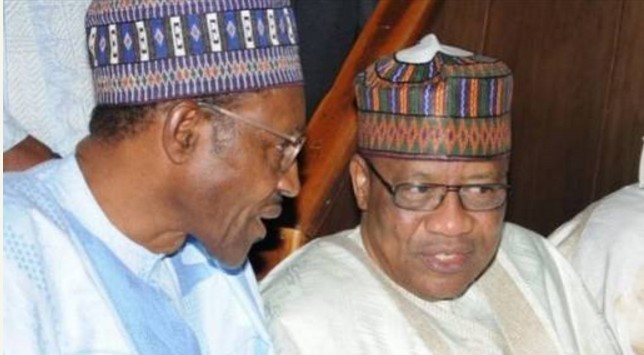
‘IBB sent bag of money to Buhari’ ·President distributed it to the poor —Biographer
Controversies over the contents of President Muhammadu Buhari’s authorized biography are not going to be over soon.
Allegations of money exchanging hands between the president and the man who toppled him in 1985, General Ibrahim Babangida, are in the book titled “Muhammadu Buhari: The Challenges of Leadership in Nigeria.”
According to accounts on page 35 of the book, after General Buhari was released from detention in 1988, IBB sent him “a bag of money” which he (Buhari) “distributed to the poor.”
“Buhari had married Safinatu Yusuf in 1971, and they had five children, a son and four daughters. In the end, Buhari and Safinatu would be divorced in 1988. He would marry Aisha Halilu in 1989, after his release from detention. They would also have five children.
“After the death of his mother in December 1988, Buhari was released and travelled to Daura for the mourning. When he arrived in Daura, he found his farm much as he had left it. His senior brother (the father of Mamman Daura), along with the Barden Daura, had managed the cattle, sheep, and horses in his absence, although a number of cattle had been sold off to pay for feed during the drought.
“Buhari was still in debt to the bank for building his home. Yet now he had no income. At that time there was no program to provide retirement funds for former heads of state. Babangida agreed to a policy to pay Buhari his military pension, a modest 1,643 naira per month for ten years.
“Babangida had originally sent Buhari “a bag of money,” but Buhari refused it and had it distributed to the poor. Buhari had negotiated his pension funds with Air Vice Marshal (rtd) Hamza Abdullahi, a military governor of Kano, who acted on behalf of Babangida,” the biographer wrote.
The book also contained details of how Buhari was arrested by two soldiers in his bedroom in consummation of the August 27, 1985 coup.
“By late spring of 1985, the number of “big men” going to jail had increased. The tribunals were open and transparent. Buhari was insistent that the courts do their duty without fear or favor. Two-thirds of those arrested and charged came from the north, that is, from the NPN base.
“As noted above, by the summer of 1985, splits were beginning to appear within the top military circle. Babangida had been part of every coup in Nigeria since 1967 and began to consider his options. He was very close to General Aliyu Gusau, who was in charge of security. As the summer unfolded, Buhari became aware that Gusau was trading in import licenses on the side. Gusau was retired by Buhari, a move that apparently upset Babangida.
“Buhari confronted Babangida and asked what he would have done in the matter of Gusau’s retirement. Babangida agreed that Gusau had to have been retired. A few days later, however, there was a knock on Buhari’s bedroom door. He opened the door and was met by two soldiers, who told him, “General Buhari, sir, you are under arrest.” Buhari would spend the next three years in detention in Benin. But at least he was alive.
“The question has arisen subsequently as to whether Buhari knew about the countercoup in advance. Given his “appreciation” of complex situation, it is argued by some, how could he not have known?
Life in Detention
“Buhari was housed in a well-guarded small bungalow in Benin City. He was not harassed by soldiers or cut off from all communication. He was given a small television set that could pick up one or two channels, plus daily newspapers and he was provided three meals a day. He was allowed visitors, but only on the specific authorization of Babangida In most cases, his visitors were members of his family, although because they lived in the north of the country, and Benin was in Edo State in the south, travel was a problem.
“Buhari’s daily routine was much the same every day. He would get up around 5a.m. for Muslim prayers, and then go back to bed; get up again around 8 or 9a.m. and have breakfast; read; have lunch; rest; exercise; pray; eat dinner; read; and sleep. The only exercise he could get was to jog around outside the house.
“He read not only newspapers, but also novels, history books and the Qur’an. His chief uncertainty in detention was when he would be released. If Babangida had wanted to kill him, he realized, he would be dead by now. Hence, he had to endure not so much anxiety as a continual sense of boredom. He was used to a Spartan lifestyle and so he did not miss material comforts But he did miss his family, and he felt acutely the loss of his freedom. He had absolutely no intention of ever reentering Nigerian political life.
“In the end, after more than three years in detention, it was the death of Buhari’s mother in December 1988 that led to his release. News of her death generated public pressure on Babangida to let Buhari return to Daura. Babangida acceded to the pressure, allowing Buhari to go back to Daura, where he would have to start his new life as a retired major general,” the author wrote.






